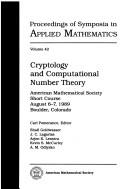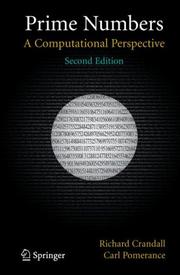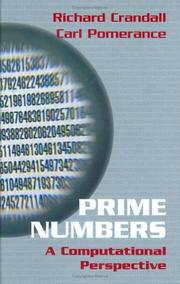| Listing 1 - 10 of 16 | << page >> |
Sort by
|

ISBN: 0821801554 Year: 1990 Publisher: Providence (R.I.): American Mathematical Society
Abstract | Keywords | Export | Availability | Bookmark
 Loading...
Loading...Choose an application
- Reference Manager
- EndNote
- RefWorks (Direct export to RefWorks)
Computers --- -Cryptography --- -Number theory --- -#TELE:COSIC --- 519.72 --- Number study --- Numbers, Theory of --- Algebra --- Cryptanalysis --- Cryptology --- Secret writing --- Steganography --- Signs and symbols --- Symbolism --- Writing --- Ciphers --- Data encryption (Computer science) --- Automatic computers --- Automatic data processors --- Computer hardware --- Computing machines (Computers) --- Electronic brains --- Electronic calculating-machines --- Electronic computers --- Hardware, Computer --- Computer systems --- Cybernetics --- Machine theory --- Calculators --- Cyberspace --- Access control --- -Congresses --- Congresses --- Information theory: mathematical aspects --- 519.72 Information theory: mathematical aspects --- Cryptography --- Number theory --- #TELE:COSIC
Book
ISBN: 9783540481843 Year: 1988 Publisher: Berlin, Heidelberg Springer-Verlag Berlin Heidelberg
Abstract | Keywords | Export | Availability | Bookmark
 Loading...
Loading...Choose an application
- Reference Manager
- EndNote
- RefWorks (Direct export to RefWorks)
Computer science --- DES (data encryption standard) --- cryptologie
Digital
ISBN: 9783540481843 Year: 1988 Publisher: Berlin, Heidelberg Springer-Verlag Berlin Heidelberg
Abstract | Keywords | Export | Availability | Bookmark
 Loading...
Loading...Choose an application
- Reference Manager
- EndNote
- RefWorks (Direct export to RefWorks)
Computer science --- DES (data encryption standard) --- cryptologie
Digital
ISBN: 9780387289793 Year: 2005 Publisher: New York, NY Springer Science+Business Media, Inc
Abstract | Keywords | Export | Availability | Bookmark
 Loading...
Loading...Choose an application
- Reference Manager
- EndNote
- RefWorks (Direct export to RefWorks)

ISBN: 1280608250 9786610608256 0387289798 0387252827 1441920501 Year: 2005 Publisher: New York, NY : Springer New York : Imprint: Springer,
Abstract | Keywords | Export | Availability | Bookmark
 Loading...
Loading...Choose an application
- Reference Manager
- EndNote
- RefWorks (Direct export to RefWorks)
Prime numbers beckon to the beginner, as the basic notion of primality is accessible even to children. Yet, some of the simplest questions about primes have confounded humankind for millennia. In the new edition of this highly successful book, Richard Crandall and Carl Pomerance have provided updated material on theoretical, computational, and algorithmic fronts. New results discussed include the AKS test for recognizing primes, computational evidence for the Riemann hypothesis, a fast binary algorithm for the greatest common divisor, nonuniform fast Fourier transforms, and more. The authors also list new computational records and survey new developments in the theory of prime numbers, including the magnificent proof that there are arbitrarily long arithmetic progressions of primes, and the final resolution of the Catalan problem. Numerous exercises have been added. Richard Crandall currently holds the title of Apple Distinguished Scientist, having previously been Apple's Chief Cryptographer, the Chief Scientist at NeXT, Inc., and recipient of the Vollum Chair of Science at Reed College. Though he publishes in quantum physics, biology, mathematics, and chemistry, and holds various engineering patents, his primary interest is interdisciplinary scientific computation. Carl Pomerance is the recipient of the Chauvenet and Conant Prizes for expository mathematical writing. He is currently a mathematics professor at Dartmouth College, having previously been at the University of Georgia and Bell Labs. A popular lecturer, he is well known for his research in computational number theory, his efforts having produced important algorithms now in use. From the reviews of the first edition: "Destined to become a definitive textbook conveying the most modern computational ideas about prime numbers and factoring, this book will stand as an excellent reference for this kind of computation, and thus be of interest to both educators and researchers." ^ L'Enseignement Mathématique "...Prime Numbers is a welcome addition to the literature of number theory---comprehensive, up-to-date and written with style." - American Scientist "It's rare to say this of a math book, but open Prime Numbers to a random page and it's hard to put down. Crandall and Pomerance have written a terrific book." - Bulletin of the AMS.
Numbers, Prime. --- Numbers, Natural. --- Natural numbers --- Numbers, Whole --- Whole numbers --- Numbers, Rational --- Prime numbers --- Numbers, Natural --- Number theory. --- Number Theory. --- Number study --- Numbers, Theory of --- Algebra --- 511.3 --- Numbers, Prime --- 681.3*F22 --- 511.3 Analytical, additive and other number-theory problems. Diophantine approximations --- Analytical, additive and other number-theory problems. Diophantine approximations --- 681.3*F22 Nonnumerical algorithms and problems: complexity of proof procedures; computations on discrete structures; geometrical problems and computations; pattern matching --See also {?681.3*E2-5}; {681.3*G2}; {?681.3*H2-3} --- Nonnumerical algorithms and problems: complexity of proof procedures; computations on discrete structures; geometrical problems and computations; pattern matching --See also {?681.3*E2-5}; {681.3*G2}; {?681.3*H2-3}
Book
ISBN: 3319222392 3319222406 Year: 2015 Publisher: Cham : Springer International Publishing : Imprint: Springer,
Abstract | Keywords | Export | Availability | Bookmark
 Loading...
Loading...Choose an application
- Reference Manager
- EndNote
- RefWorks (Direct export to RefWorks)
This volume contains a collection of research and survey papers written by some of the most eminent mathematicians in the international community and is dedicated to Helmut Maier, whose own research has been groundbreaking and deeply influential to the field. Specific emphasis is given to topics regarding exponential and trigonometric sums and their behavior in short intervals, anatomy of integers and cyclotomic polynomials, small gaps in sequences of sifted prime numbers, oscillation theorems for primes in arithmetic progressions, inequalities related to the distribution of primes in short intervals, the Möbius function, Euler’s totient function, the Riemann zeta function and the Riemann Hypothesis. Graduate students, research mathematicians, as well as computer scientists and engineers who are interested in pure and interdisciplinary research, will find this volume a useful resource. Contributors to this volume: Bill Allombert, Levent Alpoge, Nadine Amersi, Yuri Bilu, Régis de la Bretèche, Christian Elsholtz, John B. Friedlander, Kevin Ford, Daniel A. Goldston, Steven M. Gonek, Andrew Granville, Adam J. Harper, Glyn Harman, D. R. Heath-Brown, Aleksandar Ivić, Geoffrey Iyer, Jerzy Kaczorowski, Daniel M. Kane, Sergei Konyagin, Dimitris Koukoulopoulos, Michel L. Lapidus, Oleg Lazarev, Andrew H. Ledoan, Robert J. Lemke Oliver, Florian Luca, James Maynard, Steven J. Miller, Hugh L. Montgomery, Melvyn B. Nathanson, Ashkan Nikeghbali, Alberto Perelli, Amalia Pizarro-Madariaga, János Pintz, Paul Pollack, Carl Pomerance, Michael Th. Rassias, Maksym Radziwiłł, Joël Rivat, András Sárközy, Jeffrey Shallit, Terence Tao, Gérald Tenenbaum, László Tóth, Tamar Ziegler, Liyang Zhang.
Algebra --- Mathematics --- Physical Sciences & Mathematics --- Numerical analysis. --- Data structures (Computer science) --- Mathematics. --- Math --- Information structures (Computer science) --- Structures, Data (Computer science) --- Structures, Information (Computer science) --- Data structures (Computer science). --- Number theory. --- Number Theory. --- Numerical Analysis. --- Data Structures, Cryptology and Information Theory. --- Science --- Mathematical analysis --- Electronic data processing --- File organization (Computer science) --- Abstract data types (Computer science) --- Data structures (Computer scienc. --- Data Structures and Information Theory. --- Number study --- Numbers, Theory of

ISBN: 0387947779 1468493183 1468493167 Year: 2001 Publisher: New York (N.Y.): Springer
Abstract | Keywords | Export | Availability | Bookmark
 Loading...
Loading...Choose an application
- Reference Manager
- EndNote
- RefWorks (Direct export to RefWorks)
In this volume we have endeavored to provide a middle ground-hopefully even a bridge-between "theory" and "experiment" in the matter of prime numbers. Of course, we speak of number theory and computer experiment. There are great books on the abstract properties of prime numbers. Each of us working in the field enjoys his or her favorite classics. But the experimental side is relatively new. Even though it can be forcefully put that computer science is by no means young, as there have arguably been four or five computer "revolutions" by now, it is the case that the theoretical underpinnings of prime numbers go back centuries, even millennia. So, we believe that there is room for treatises based on the celebrated classical ideas, yet authored from a modern computational perspective. Design and scope of this book The book combines the essentially complementary areas of expertise of the two authors. (One author (RC) is more the computationalist, the other (CP) more the theorist. ) The opening chapters are in a theoretical vein, even though some explicit algorithms are laid out therein, while heavier algorithmic concentration is evident as the reader moves well into the book. Whether in theoretical or computational writing mode, we have tried to provide the most up-to-date aspects of prime-number study. What we do not do is sound the very bottom of every aspect.
Numbers, Prime. --- Numbers, Prime --- 511.3 --- Prime numbers --- Numbers, Natural --- 511.3 Analytical, additive and other number-theory problems. Diophantine approximations --- Analytical, additive and other number-theory problems. Diophantine approximations --- Number theory. --- Number Theory. --- Number study --- Numbers, Theory of --- Algebra
Digital
ISBN: 9783319222400 9783319222394 9783319222417 9783319355511 Year: 2015 Publisher: Cham Springer International Publishing
Abstract | Keywords | Export | Availability | Bookmark
 Loading...
Loading...Choose an application
- Reference Manager
- EndNote
- RefWorks (Direct export to RefWorks)
This volume contains a collection of research and survey papers written by some of the most eminent mathematicians in the international community and is dedicated to Helmut Maier, whose own research has been groundbreaking and deeply influential to the field. Specific emphasis is given to topics regarding exponential and trigonometric sums and their behavior in short intervals, anatomy of integers and cyclotomic polynomials, small gaps in sequences of sifted prime numbers, oscillation theorems for primes in arithmetic progressions, inequalities related to the distribution of primes in short intervals, the Möbius function, Euler’s totient function, the Riemann zeta function and the Riemann Hypothesis. Graduate students, research mathematicians, as well as computer scientists and engineers who are interested in pure and interdisciplinary research, will find this volume a useful resource. Contributors to this volume: Bill Allombert, Levent Alpoge, Nadine Amersi, Yuri Bilu, Régis de la Bretèche, Christian Elsholtz, John B. Friedlander, Kevin Ford, Daniel A. Goldston, Steven M. Gonek, Andrew Granville, Adam J. Harper, Glyn Harman, D. R. Heath-Brown, Aleksandar Ivić, Geoffrey Iyer, Jerzy Kaczorowski, Daniel M. Kane, Sergei Konyagin, Dimitris Koukoulopoulos, Michel L. Lapidus, Oleg Lazarev, Andrew H. Ledoan, Robert J. Lemke Oliver, Florian Luca, James Maynard, Steven J. Miller, Hugh L. Montgomery, Melvyn B. Nathanson, Ashkan Nikeghbali, Alberto Perelli, Amalia Pizarro-Madariaga, János Pintz, Paul Pollack, Carl Pomerance, Michael Th. Rassias, Maksym Radziwiłł, Joël Rivat, András Sárközy, Jeffrey Shallit, Terence Tao, Gérald Tenenbaum, László Tóth, Tamar Ziegler, Liyang Zhang.
Number theory --- Numerical analysis --- Information systems --- Computer. Automation --- informatica --- informatietechnologie --- getallenleer --- numerieke analyse
Book
ISBN: 0883850540 Year: 1984 Publisher: Washington (D.C.): Mathematical association of America
Abstract | Keywords | Export | Availability | Bookmark
 Loading...
Loading...Choose an application
- Reference Manager
- EndNote
- RefWorks (Direct export to RefWorks)
Book
ISBN: 3540187960 3540481842 0387187960 Year: 1988 Volume: 293 Publisher: Berlin Heidelberg New York Springer
Abstract | Keywords | Export | Availability | Bookmark
 Loading...
Loading...Choose an application
- Reference Manager
- EndNote
- RefWorks (Direct export to RefWorks)
Zero-knowledge interactive proofsystems are a new technique which can be used as a cryptographic tool for designing provably secure protocols. Goldwasser, Micali, and Rackoff originally suggested this technique for controlling the knowledge released in an interactive proof of membership in a language, and for classification of languages [19]. In this approach, knowledge is defined in terms of complexity to convey knowledge if it gives a computational advantage to the receiver, theory, and a message is said for example by giving him the result of an intractable computation. The formal model of interacting machines is described in [19, 15, 171. A proof-system (for a language L) is an interactive protocol by which one user, the prover, attempts to convince another user, the verifier, that a given input x is in L. We assume that the verifier is a probabilistic machine which is limited to expected polynomial-time computation, while the prover is an unlimited probabilistic machine. (In cryptographic applications the prover has some trapdoor information, or knows the cleartext of a publicly known ciphertext) A correct proof-system must have the following properties: If XE L, the prover will convince the verifier to accept the pmf with very high probability. If XP L no prover, no matter what program it follows, is able to convince the verifier to accept the proof, except with vanishingly small probability.
cryptografie --- cryptologie --- Information systems --- Computer security --- Cryptography --- Data transmission systems --- Sécurité informatique --- Cryptographie --- Données --- Congresses --- Security measures --- Congrès --- Transmissions --- Sécurité --- Mesures --- Sécurité informatique --- Données --- Congrès --- Sécurité --- Data encryption (Computer science). --- Cryptology. --- Data encoding (Computer science) --- Encryption of data (Computer science)
| Listing 1 - 10 of 16 | << page >> |
Sort by
|

 Search
Search Feedback
Feedback About
About Help
Help News
News